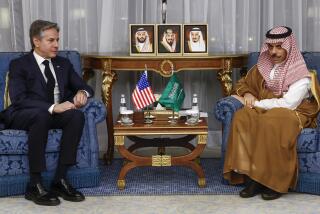Shultz, Gromyko to Confer Today on Arms Control, Other Issues
- Share via
VIENNA — Secretary of State George P. Shultz arrived Monday for talks with Soviet Foreign Minister Andrei A. Gromyko about the deadlocked nuclear arms control talks and other points of Washington-Moscow friction.
Shultz flew to Vienna after a frustrating Mideast trip in which he apparently made no substantive progress toward his goal of initiating peace talks between Israel and its Arab neighbors.
Gromyko is scheduled to arrive this morning, a few hours before the meeting is due to begin at the Soviet Embassy.
Shultz said his first meeting with Gromyko in five months will be timely because it comes during a recess in the Geneva arms control talks, which so far have been long on acrimony and short on negotiating progress.
“It is important to do everything possible to make those (arms) negotiations successful,” Shultz told reporters aboard his U.S. Air Force plane on the flight from Aqaba, Jordan.
In the meeting with Gromyko, Shultz is expected to raise the issue of the killing of U.S. Army Maj. Arthur D. Nicholson Jr., who was shot last March by a Soviet sentry while on an assignment in East Germany. Washington has rejected Soviet claims that the sentry acted properly because Nicholson, a member of a U.S. liaison team, had entered a restricted military area.
U. S. anger over the shooting was compounded by the Kremlin’s subsequent rejection of an apparent agreement, made at a meeting of high-ranking U.S. and Soviet officers, that violence would not be used in such cases in the future.
Gromyko and Shultz are also expected to discuss a possible summit between President Reagan and Soviet leader Mikhail S. Gorbachev, who is expected to attend the opening of the U.N. General Assembly meeting in New York in the fall.
Shultz and Gromyko planned their trips to Vienna to attend ceremonies marking the 30th anniversary of the treaty that ended the four-power occupation of Austria after World War II and established the country as a unified and neutral state--in contrast to the indefinite division of Germany, its wartime ally.
Shultz said he and Gromyko almost always use such ceremonial occasions for talks, developing what he called a “more conversational” approach to Washington-Moscow disagreements.
Results of Mideast Visit
In a press conference before leaving Aqaba and in a later conversation with reporters aboard the airplane, Shultz put the best possible interpretation on the outcome of his Middle East trip.
“The main thing that I take away from my visit in Israel, Egypt and Jordan is a genuine sense of movement, a fairly widely shared desire to see things move forward,” Shultz said. “This is partly kind of the atmosphere of it--the way it feels talking to people and seeing the attitudes--and partly one thing and another that can be pointed to in a substantive way. So, I’m encouraged by the whole swing around, and what we have to do is keep the movement going.”
When asked to cite evidence of any progress, Shultz listed three developments: the agreement two months ago between Jordan and the Palestine Liberation Organization to pursue a joint peace strategy; a statement by the Israeli Cabinet on Sunday that Israel is prepared to negotiate with any Palestinians who do not subscribe to the Palestine national covenant (which calls for Israel’s ultimate destruction), and a recent decision by the Israeli government to permit the establishment of an Arab bank on the Israeli-occupied West Bank of the Jordan River.
Shultz said the “next major event” in the Middle East peace process will take place early next month, when King Hussein of Jordan is scheduled to visit the White House for talks with Reagan. But when asked if Hussein would bring with him a list of Palestinians who might be acceptable members of the proposed Jordan-Palestinian delegation, Shultz said, “I don’t think there is any expectation of that.”
More to Read
Sign up for Essential California
The most important California stories and recommendations in your inbox every morning.
You may occasionally receive promotional content from the Los Angeles Times.













